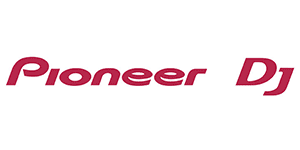
Pioneer DJ entered the industry of DJing in 1994 having Yoshiaki Ide as the leader of the company. At that time the legendary brand invented the very first DJ-controller in the world - CDJ-500. For 20 years the company has been devoted to the production of professional DJ devices, monitors and headphones. But the fame came with DJ-controllers which always supported Pioneer DJ, their philosophy is all about introduction of innovations, creating inspiration, and awakening entertainment.
As previously mentioned the first DJ-controller CDJ-500 appeared in the 1994. It featured a master tempo for BPM adjusting, and a turntable responsible for pitch. In addition, it had a loop function (limited to a few minutes). The device brought attention, and the turntable concept began to be used by many other manufacturers. Thanks to enthusiastic responses to the product, Pioneer DJ released an improved version of CDJ-500II which comprised: longer loops and an advanced master tempo. In 1996 the first mixer was released. It had 4 sections with a common crossfader, and a 3-band equalizer. Besides, it had a set of 7 effects: auto BPM, delay, echo, reverb, pitch change, flanger and send/return. The next year the company released Pioneer SE-DJ5000 headphones.
The peak of the popularity of Pioneer DJ happened to be in 2001 when the controller CDJ-1000 was released the interface of which turned out to be very similar to the elements of conventional vinyl control (in the center of the turntable the inscription Vinyl actually makes a hint). It combines a small screen displaying waveforms and other values, backlight for the turntable, and vinyl emulation. In addition, the device has a reverse and “infinite” loop option. Apparently the brand doesn’t change the position of the fader and tempo but it also emphasizes its individuality. The following CDJ-1000 MK2 and MK3 models feature 100% pitch (and a more accurate 16% setting), a bright display, adjustable turntable resistance, and a quick response to button press.
CDJ series weren’t going to be forgotten - it has undergone many updates over the years but no device could compare to the power and versatility of the flagship CDJ-2000 Nexus (2012 release). It has an impressive 480x234 pixel resolution LCD displaying color waveforms offering 5 zoom levels. In addition DJs can view the tracks, their detailed information, and even see a full-fledged album cover on a large panel. There are backlit buttons around the screen which are used to select the type of the source (USB, SD, CD), navigation via the menu and track info. What makes it really attractive is that it supports various formats (MP3, AAC, WAV, AIFF), including CDs. For a convenient performance a new quantization function is provided to prevent discrepancies between loops. Another addition is the slip button which allows you to stop playback, make a scratch, create a loop, and twist the reverse without losing track position.
This year Pioneer DJ, in cooperation with Dave Smith Instruments, made a serious step in the world of production releasing Toraiz SP-16. The professional sampler has 16 channels capable of sampling fragments up to 30 seconds, 16 multi-color pads, 16-step (max 64) sequencer with the ability to automate the parameters, a touchscreen, and an analog low pass filter officially provided by Dave Smith.
The combination of touch-sensitive pads and a step sequencer makes this unit very convenient for playing, recording, and setting up sequences. All basic manipulations: loading, recording and editing (changing envelopes, effects, etc.) are displayed on the touch screen and are tweaked with auxiliary knobs. The sample browser is also displayed - you can download loops from the internal storage (8 GB), or externally via USB.
Pioneer DJ has brought to the world of DJing a lot of flawless devices, from DJ controllers/mixers to monitors/headphones. Their instruments are recognized by many world DJs, such as: Carl Cox, Roger Sanchez, Jazzy Jeff, James Zabiela, Paul Oakenfold.

